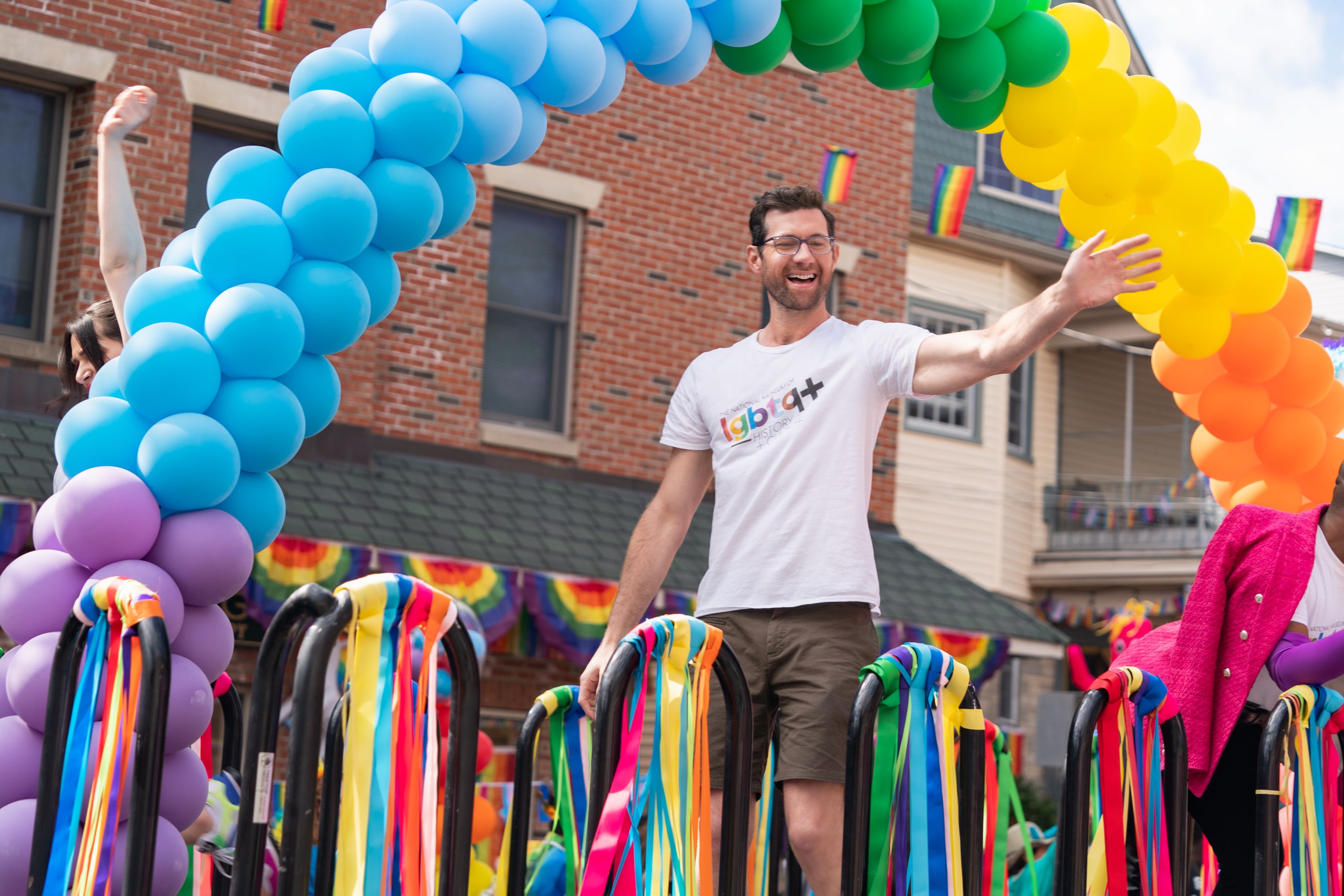Neither star/co-writer Billy Eichner nor director/co-writer Nicholas Stoller are strangers to self-awareness in their work, so it’s unsurprising that their new collaboration Bros includes, in its opening sequence, a bit of a wink: Eichner’s character, an openly gay media personality, talking to a studio executive about writing a gay romantic comedy. But not just a gay romantic comedy, the nervous exec insists: “We just want to make a movie that everyone can like,” mouthpiecing the notions of universality and crossover appeal that seem to greet every new work of potentially inclusive art. Eichner balks; this squaresville suit is sent up, and rightly so. It’s odd, then, that Eichner and Stoller proceed to pretty much make the movie that guy pitches.
Eichner stars as Bobby Leiber, whom we’re told is a “podcast powerhouse,” though he’s only ever seen doing that job – and not really doing it, since he’s on camera and taking live calls – in the opening sequence, presumably as a device for quick and easy exposition. He spends most of his time heading the board of directors for New York’s soon-to-open LGBTQ+ history museum, spending time with his friends, and being proudly single; “You cobble together a version of a romantic single life,” he explains. “It’s a lot more than a lot of other people have in this life. And you try to remember that.” With a potential partner, he’s more blunt: “No one is more emotionally unavailable than I am! I pride myself on it!”
But this is a romantic comedy, so we of course must operate under the assumption that such a life cannot possibly be emotionally satisfying. One night, at a launch party for a dating app, he meets Aaron (the charming Luke Macfarlane), who is equally non-committal. But (again, this is a romantic comedy) they start seeing each other casually, and then not as casually, and then they’re dating in spite of themselves, but then complications ensue, and so on.
Bros works best in its early passages, before Eichner and Stoller’s script turns itself over, without much struggle, to the rom-com machinery. That’s because those early scenes are the ones keenly concerned with the contemporary gay male experience: the frustrations of text/message flirting (“Can you like my ‘later,’ bitch?”), the struggle of trying to take a good dirty pic, the complexities of gay desire (“Honestly it’s been a blast catering to your whims, and I can’t really say anything because I do it all the time!”), and the mechanics of gay sex (especially in group setting).
The scenes are funny, unsurprisingly, and some of the biggest laughs come from little throwaway gags, like an ongoing preoccupation with the grudgingly inclusive Christmas movies of the “Hallheart Channel” (their first bi Christmas movie is called Christmas with Either), or Bobby telling Aaron, “You’re like a grown-up gay boy scout and I’m like… whatever happens to Evan Hansen.” Eichner’s comic timing is aces – watch how savvily he uses the wine glass as a prop during an uncomfortable conversation with Aaron’s parents – and Stoller, as usual, is very good at getting a laugh with a cut.

So the funniest stretches of the script are those that are most specific, and the frankness of the sex scenes are the most refreshing – these flashes are exciting, because (true to the exhausting advance hype) they’re things we haven’t really seen before in many mainstream movies. The trouble is that so much of the picture is spent squeezing it into the straightjacket of the conventional romantic comedy. Their script explicitly name-checks You’ve Got Mail and When Harry Met Sally, among others, and there are laughs to be had in satirizing or subverting the tropes – scoring a lightning-fast, cold and awkward Grindr hookup with “Our Love Is Here to Stay,” for example, or a later round of rough sex play and poppers to Nat King Cole.
But Eichner and Stoller want to have it both ways (if you’ll pardon the pun). We’ve thoroughly romanticized the romantic comedy these days, since they’ve become such an endangered species, that it’s easy to forget how many of them were subpar, or how even the good ones often utilized tiresome, dusty clichés. Bros too frequently embraces those clichés, with predictable break-ups resulting from misunderstandings based on split second timing, for example, or reunions forged by public declarations of love, or the endless walk-and-talk montages, set to a war crime of a score by Marc Shaiman that drowns the soundtrack in soupy, plinky swill.
And unlike the best rom-coms (or the better works of its producer and guiding influence, Judd Apatow), the picture cannot seem to navigate the comingling of comedy and drama, so when it flips into fight and break-up mode, the already waning laugh lines disappear altogether. That becomes a real problem, because the dramatic dialogue is overstuffed with clichés and maudlin sap.
Apatow’s influence is also felt in the outcome of the picture (spoilers, but, yet again, this is a romantic comedy), which amounts to “Trainwreck, but gay.” In an early meeting of the museum board, Eichner sneers at the idea of an exhibit about gay marriage because of its heteronormativity, but as with Apatow’s earlier Amy Schumer comedy about a freewheeling good-time girl, any subversion of societal norms is all but undone by slapping on a conventional, conservative-tinged resolution – the happily ever after required of the genre.
Ultimately, Bros has laughs, a bit of warmth, and some charming performances, but it’s a prime example of toothless progress: Representation matters, yes, but it can only go so far. The argument to such criticisms, at least historically, is that they have to give us the safe, conventional version of the mainstream big-studio gay rom-com before we can really get something fresh and specific. But… what if we just skipped that step?
C
“Bros” is out today in theaters.



